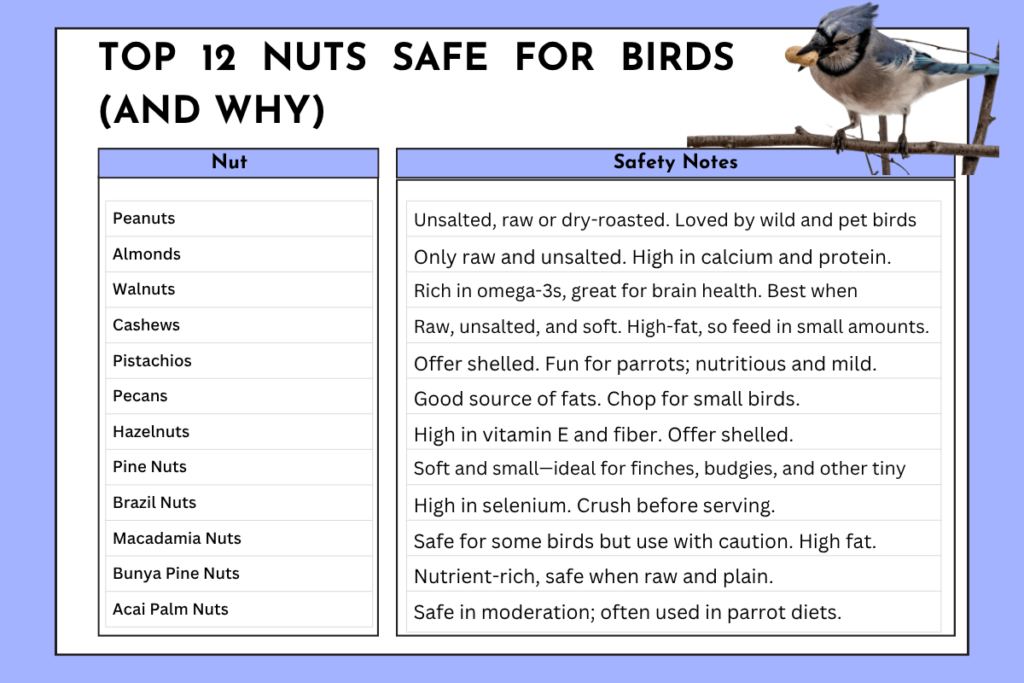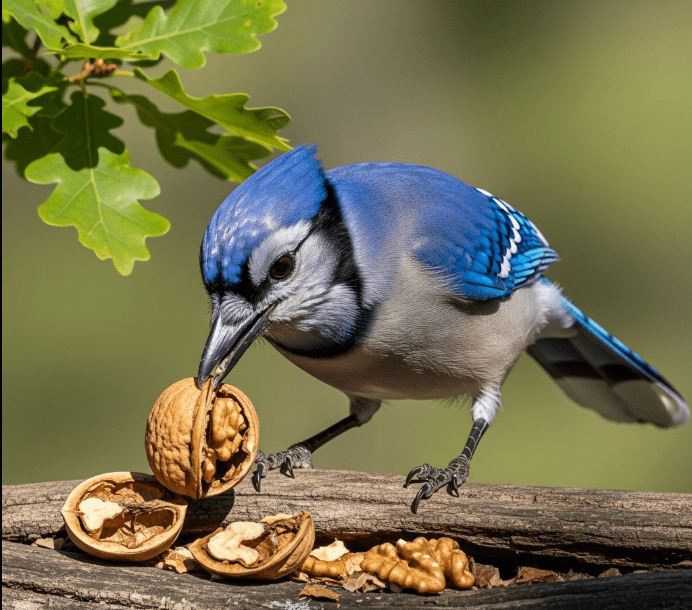What nuts can birds eat? You might be feeding them something that could slowly poison them. If you’ve ever watched a parrot crack open a peanut or seen backyard birds gather around a feeder, you know one thing: birds love nuts. But while many nuts are safe and even healthy, some can be harmful, especially if they’re salted, flavored, or moldy.
This complete guide explains which nuts are safe, how to serve them, and what to avoid, whether you’re feeding a pet parrot or supporting wild birds in winter.
Are Nuts Safe for Birds?
Yes — when given correctly. Nuts are packed with protein, healthy fats, and nutrients birds need, but they should always be:
- Raw or dry-roasted, never salted or seasoned
- Mould-free and fresh
- Shelled for small birds or chopped to prevent choking
- Fed in moderation as a treat, not a staple
If you’re feeding birds outdoors, remember that spoiled or moldy nuts can be fatal, especially for species like crows and pigeons. For prevention tips, explore how to keep birds away from bird feeders when pests become an issue.
Top 12 Nuts Safe for Birds (And Why)
Here’s a breakdown of the best nuts for birds and what makes each one beneficial:

⚠️ Avoid bitter almonds, as they contain cyanide and are toxic.
Which Birds Can Eat Nuts?
Most seed-eating and fruit-eating birds can enjoy nuts, including:
- Parrots, Macaws, Cockatoos
- Budgies, Lovebirds, Cockatiels
- Finches, Canaries
- Crows, Jays, Magpies
- Woodpeckers, Tits, Nuthatches
- Pigeons and Doves
Always adjust the nut size based on the bird species. If you’re feeding pigeons specifically, consider pairing this guide with our tips on what to feed pigeons safely.
How to Serve Nuts to Birds Safely
To keep your birds healthy, follow these nut-feeding guidelines:
- Remove shells for smaller birds or those not accustomed to cracking nuts.
- Chop large nuts into small pieces to prevent choking.
- Mix with fruits or seeds for variety and enrichment.
- Freeze for 24 hours if you’re unsure about pests or freshness.
- Limit feeding to 2–3 times a week to avoid obesity.
For wild birds:
- Use mesh feeders or weatherproof cages.
- Avoid plastic trays that collect moisture and spoil nuts faster.

Nuts to Avoid
Some nuts can be toxic or harmful if given improperly:
- Salted or roasted nuts – Salt harms birds’ kidneys.
- Flavored or coated nuts – Spices, sugar, and chocolate are dangerous.
- Moldy peanuts – Can carry deadly aflatoxins.
- Chestnuts – Not recommended for birds due to potential toxicity and digestive issues. It’s best to avoid feeding chestnuts altogether.
- Macadamia nuts – Safe for some species, but others show adverse reactions.
Can Baby Birds Eat Nuts?
No. Never feed nuts to baby birds. Their digestive systems aren’t developed enough, and they can choke easily. Feed only soft, age-appropriate foods like soaked seeds or insect protein until they’re fully fledged. If you’re unsure how to care for a young bird, see our guide on how to help injured birds for age-appropriate care tips.
Signs of Nut-Related Illness in Birds
Warning Signs: If a bird consumes harmful nuts or too many nuts, watch for symptoms such as lethargy, vomiting, diarrhea, difficulty breathing, or loss of appetite. If you notice any of these, consult an avian veterinarian promptly.
Environmental Considerations for Wild Bird Feeding
Feeder Hygiene: Regularly clean and disinfect nut feeders to prevent mold growth and the spread of diseases among wild birds. Avoid using plastic trays that retain moisture, which can spoil nuts faster.
FAQ: Nuts and Birds
Yes, if it’s 100% natural, unsweetened, and unsalted. Mix with oats to reduce stickiness.
2–3 times a week is ideal. Nuts are high in fat and should be treats, not meals.
Usually not. Most contain salt, flavors, or preservatives. Read labels carefully.
Yes. Store them in airtight containers in a cool, dry place. Discard any that smell rancid or show mold.
Final Thoughts
Nuts can be a fantastic treat for birds when given correctly — raw, unsalted, shelled (if needed), and in moderation. They offer vital nutrients like healthy fats, protein, and trace minerals. If you’re feeding wild birds, nuts are especially valuable in cold months when natural food sources disappear.
